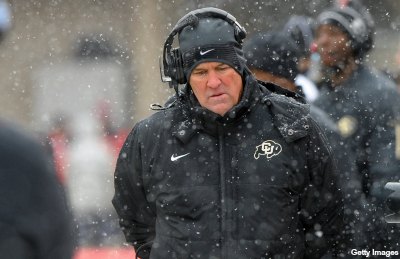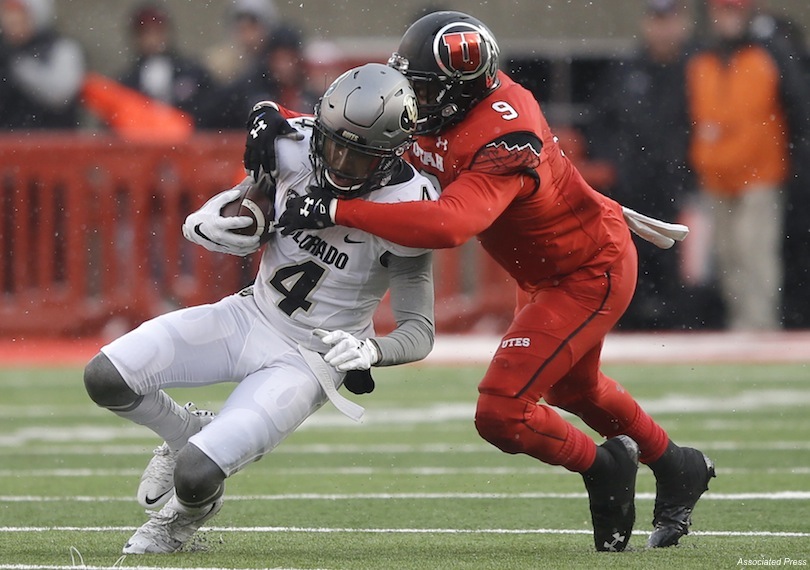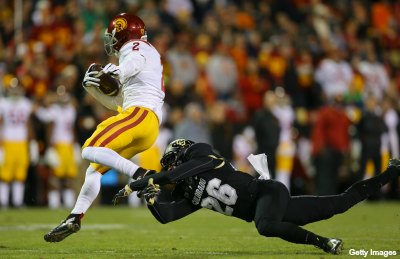This week the Big 12 formally tasked commissioner Bob Bowlsby to begin the expansion process, and time is of the essence. It would not be a surprise if a decision is made before the end of the year.
The only question: whether the Big 12 will be its eponymous self again, or go for two more to become the Big 14?
Bowlsby's phones have been ringing off the hook for some time now, but the courting has only intensified by all the schools vying to join the ranks of the Power 5. This may be the final chance for the current have-nots to fulfill their champagne wishes and caviar dreams.
But there's a team that the Big 12 ought to consider, one that used to be in the Big 12. Colorado, whose exit in 2011 helped kick off a mass exodus that nearly imploded the conference, might not be totally against the idea of coming back. Its marriage to the Pac-12 hasn't exactly been a blissful one.

When the Buffs left, the Big 12 was on the verge of collapse. Nebraska was headed out to the Big Ten, Texas A&M and Missouri soon departed for the SEC. Texas and Oklahoma were being courted by the Pac-10, which considered poaching nearly half of Big 12's teams.
When then-commissioner Dan Bebee made the enticing deal to get Texas to stay, Colorado became the Pac-10's fallback option, and soon it signed up -- along with Utah -- at a time when the conference was about to launch a new television network by its ambitious new commissioner.
But fast forward five years. The Pac-12 Network is an epic failure. Counting third-tier TV rights, Pac-12 teams will earn less per year than any other Power-5 conference, and that gap will only grow wider with the ACC scheduled to launch its own network (bankrolled by ESPN) and the Big 12 next in line if the expansion process goes well.

From the Pac-12's perspective, the feeling about Colorado is pretty much mutual. While Utah has become a legitimate title contender in the rough Pac-12 South, the Buffs have gone 14-48 in their five years in the conference, with a 4-8 season in 2013 their high-water mark. They have won a grand total of five Pac-12 games in as many years, and lost their last 20 against South Division foes.
While Colorado became a national power in the late '80s and early '90s under Bill McCartney by successfully recruiting in Southern California -- reeling in considerable talent, including 1994 Heisman winner Rashaan Salaam -- it has never felt like a right fit culturally with the Pac-12.
CU joined the Big Eight in 1947 until that conference became the Big 12 in 1996. Its natural rival had been Nebraska with many memorable games against NU over the years, including an epic 62-24 beatdown in 2001 that should've propelled the Buffs (not the vanquished Huskers) into the BCS national championship game.

Sure, Colorado had reasons to bolt in 2011, but there are just as many reasons for it to return to the conference now. How realistic, though, is the scenario for the Buffs to go back to the Big 12?
It's probably unlikely, but not impossible. First, the Pac-12 does not have an exit fee for members to leave the conference, although it does have a television grant of rights for all existing members through August 2024, meaning anybody leaving would have to forfeit their TV rights money until then. But like all contracts, both parties may negotiate their way out of them.
The bigger obstacle might be that as much as Colorado hasn't exactly been an asset to the Pac-12, the conference doesn't have any real viable option to replace it. USC and UCLA will oppose any other California school (i.e. San Diego State) joining the conference, likewise Utah with BYU, and Boise State and UNLV are non-starters because of their academic standards.
Don't take too much from Pac-12 commissioner Larry Scott's recent meeting with the University of Houston. That was nothing more than a courtesy call that helps the Cougars to leverage the Big 12 (exactly what was in it for the Pac-12 is a bit unclear). The Pac-12 is not going to venture into Texas unless it can reel in, well, the University of Texas.
So Colorado's returning to the Big 12 remains a remote possibility, but it's something the university's leaders must at least consider. Their worst nightmare would be for rival Colorado State -- a hot candidate to join the Big 12 -- to end up in that conference, making more money and getting better exposure.
Isn't that what college athletics are really all about?
More College Football:
-- Pokemon Go Places Pikachu On Nick Saban's Desk
-- College Football's Offseason Winners And Losers
-- Why Is Les Miles Dressed Up As A Police Officer?
-- Samuel Chi is the managing editor of RealClearSports.com and proprietor of College Football Exchange. Follow him on Twitter at @ThePlayoffGuru.





